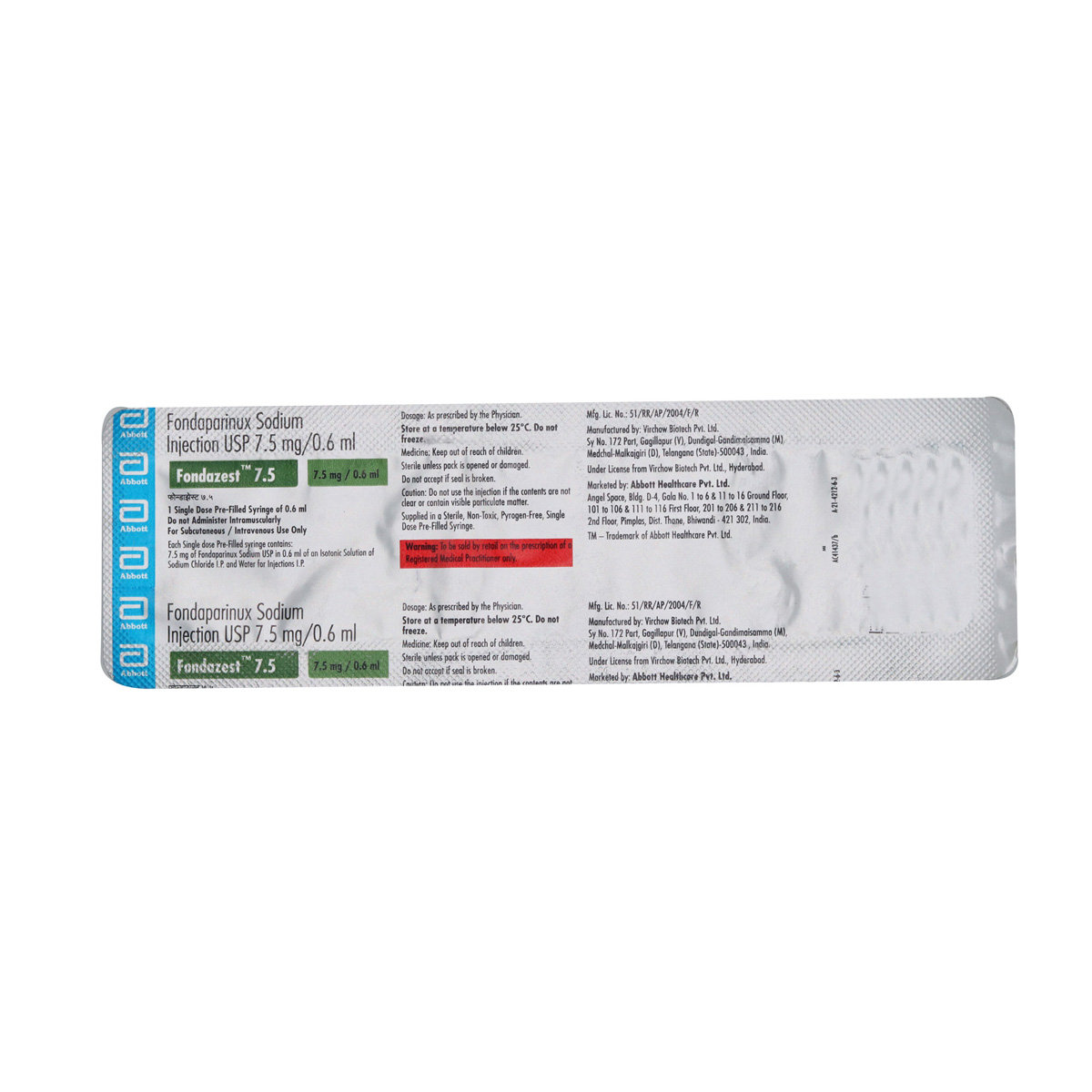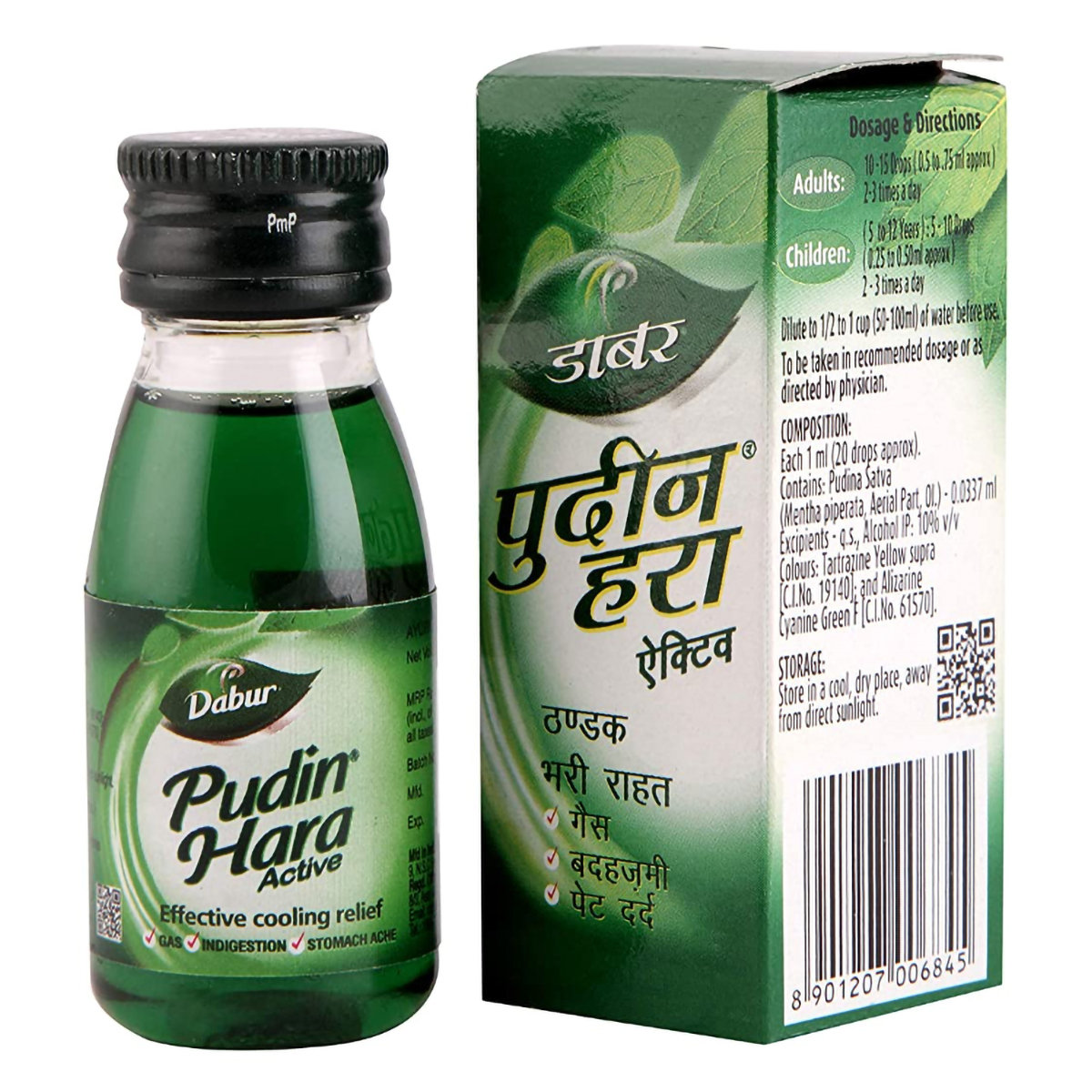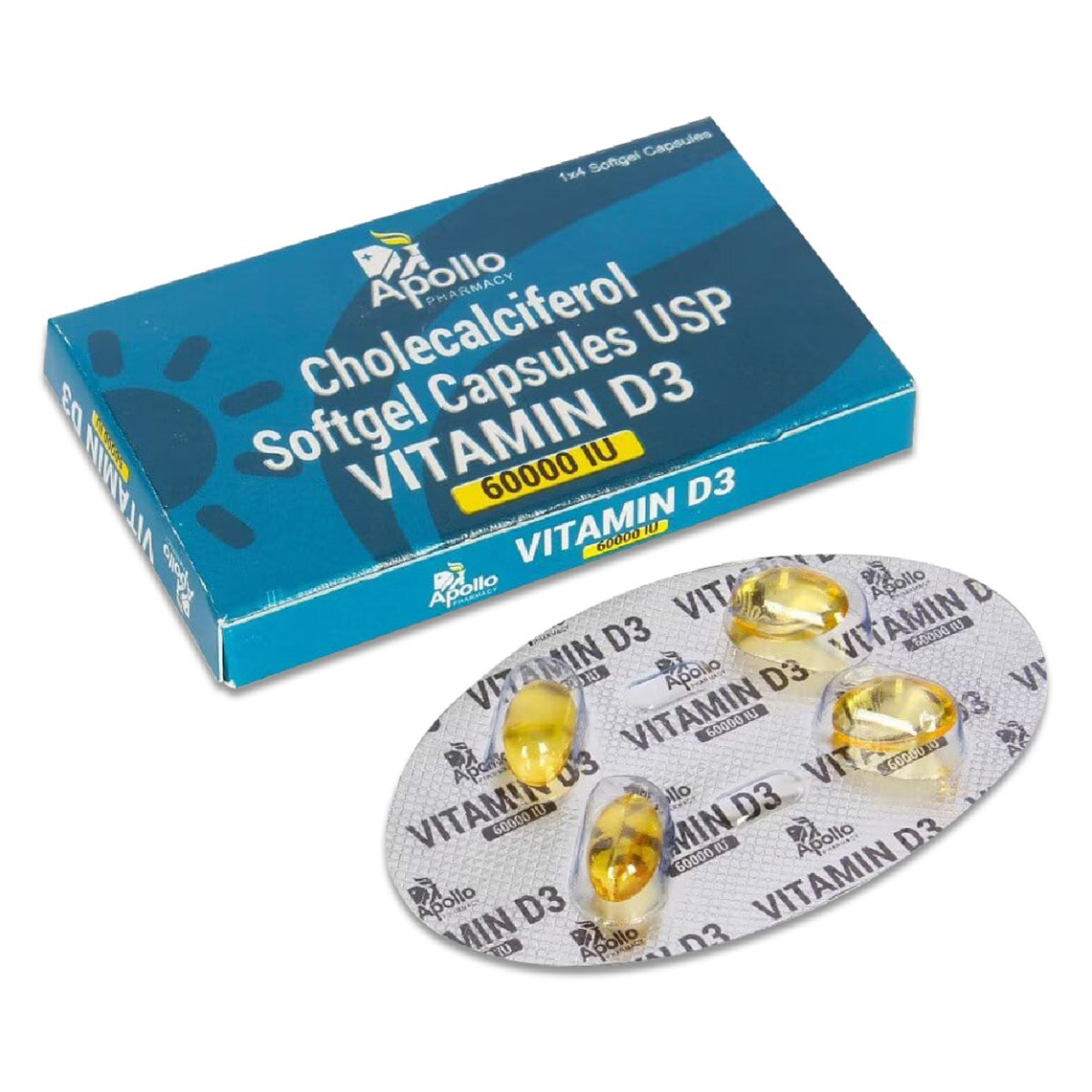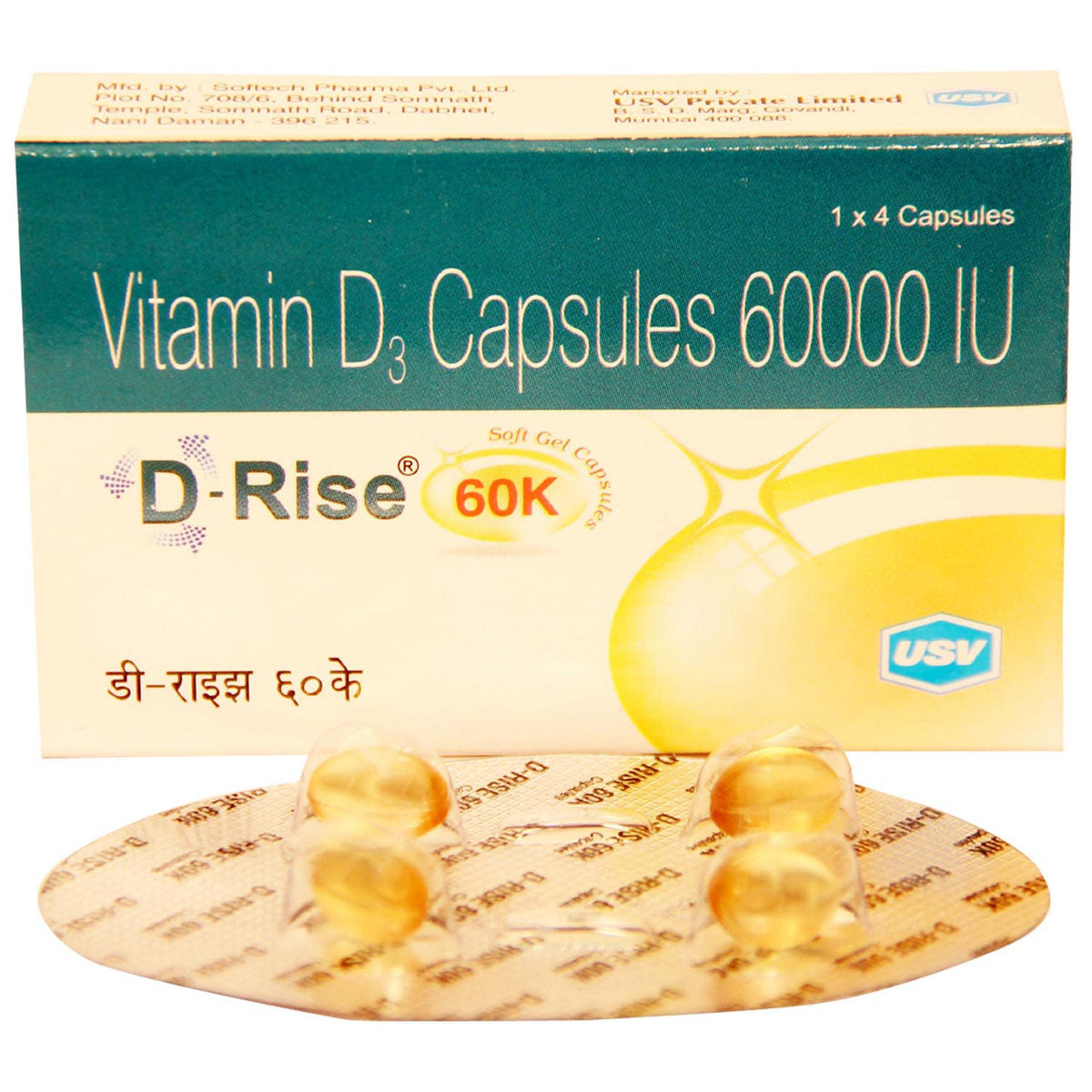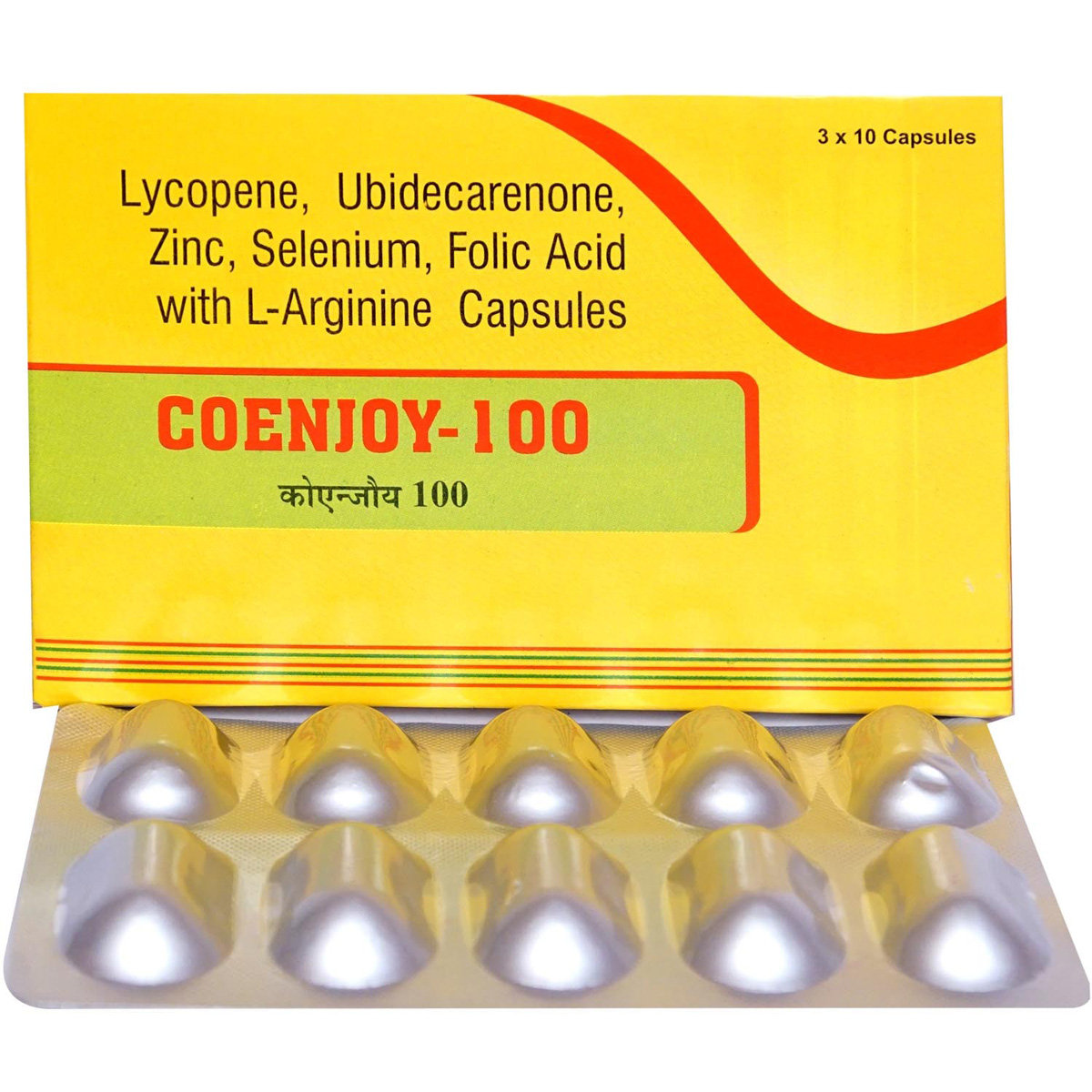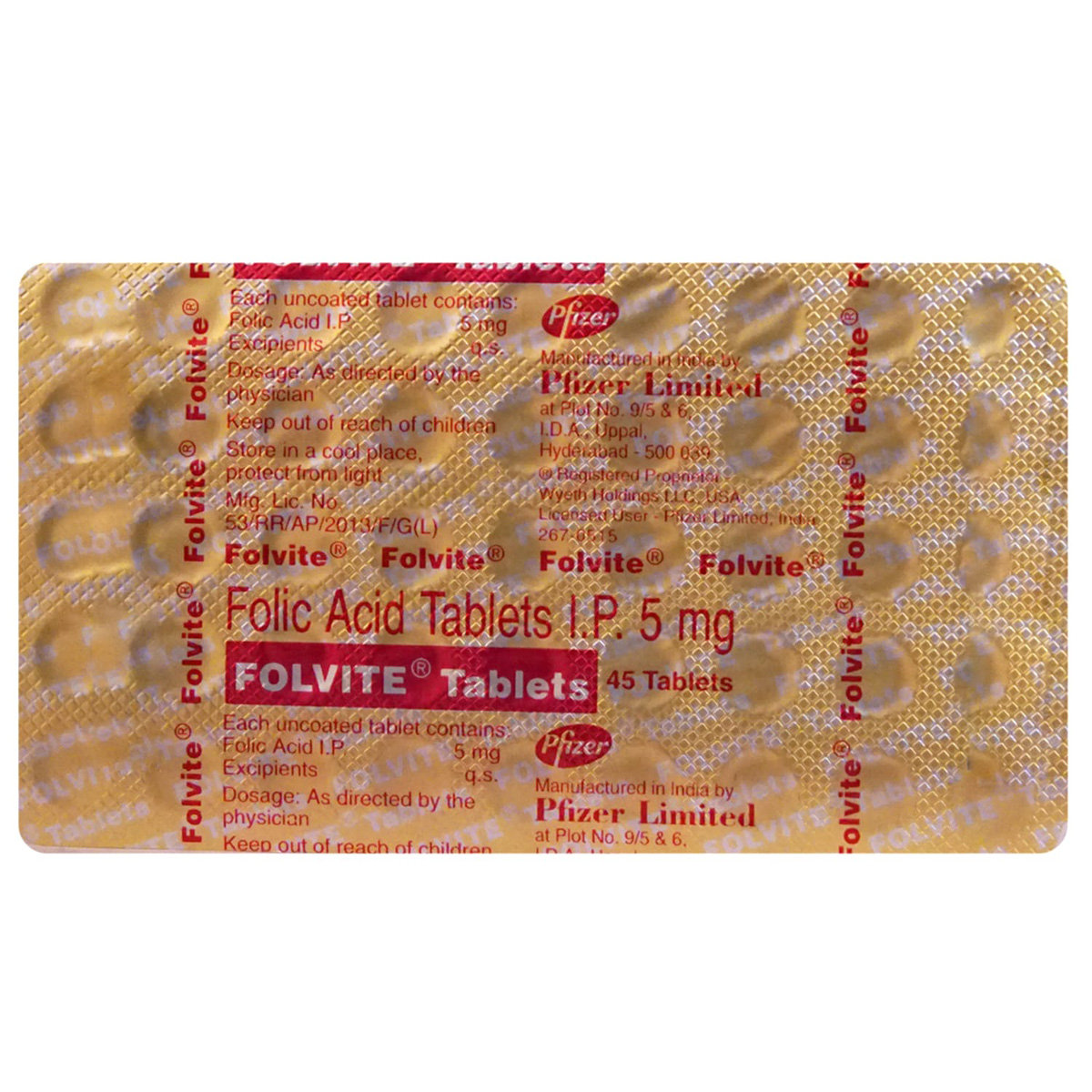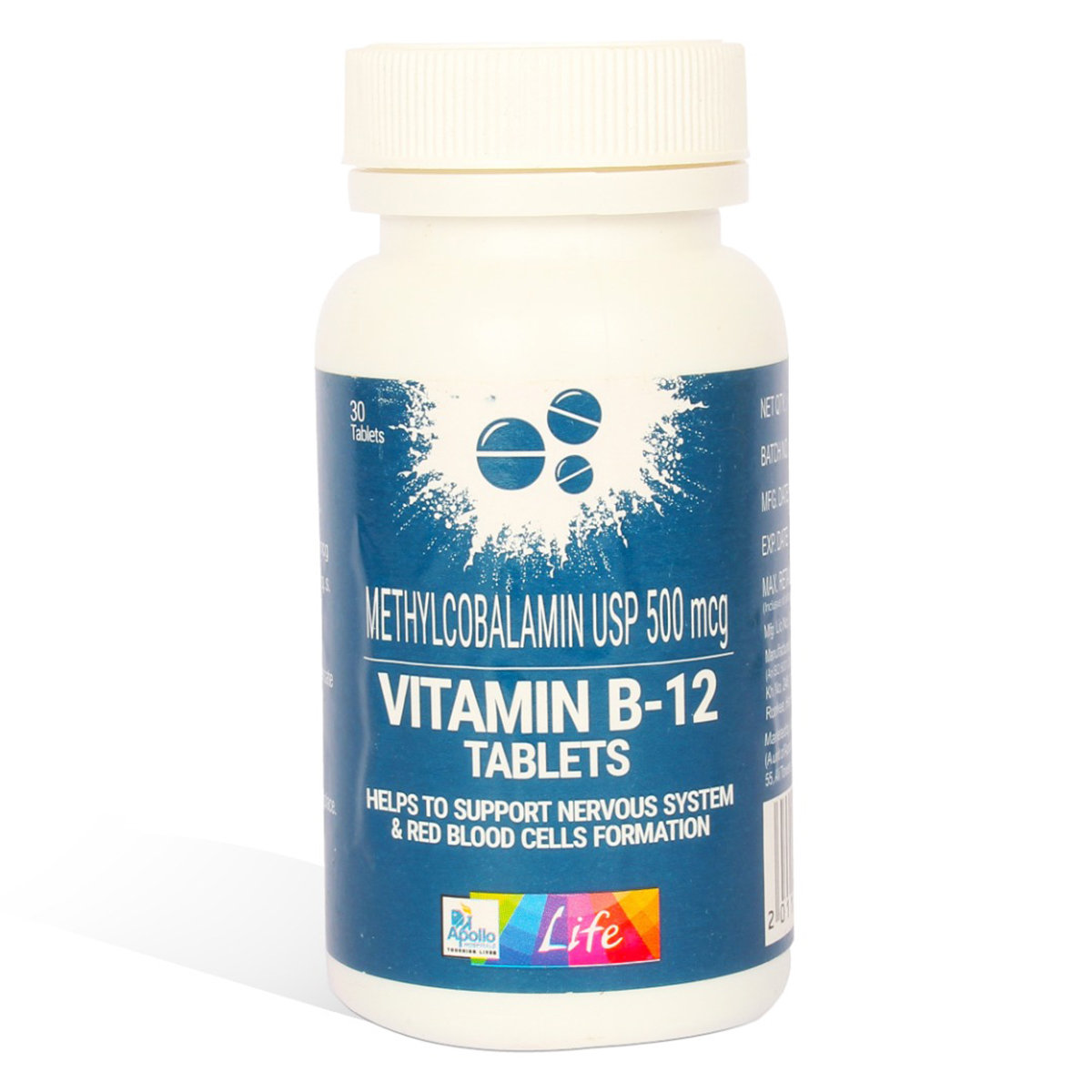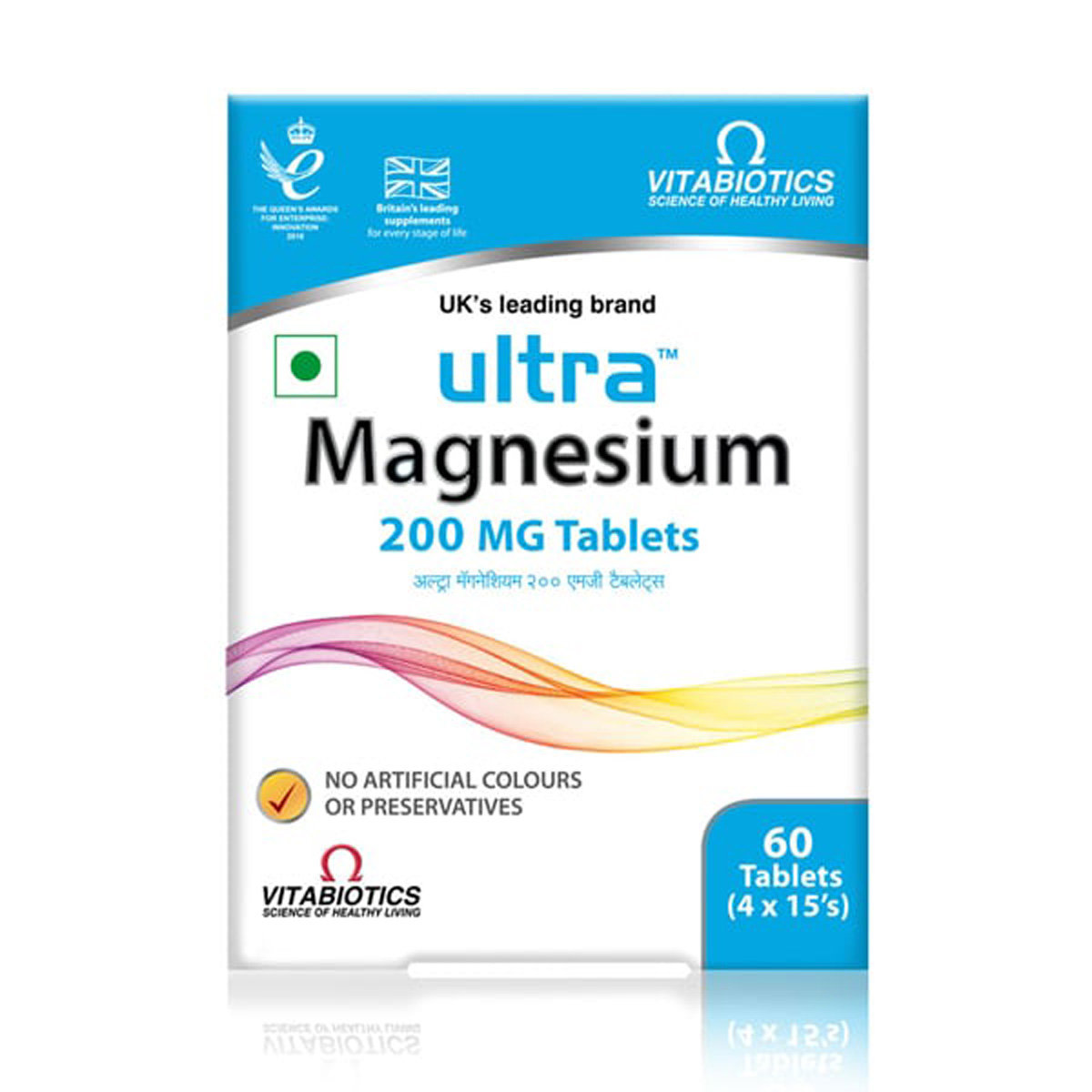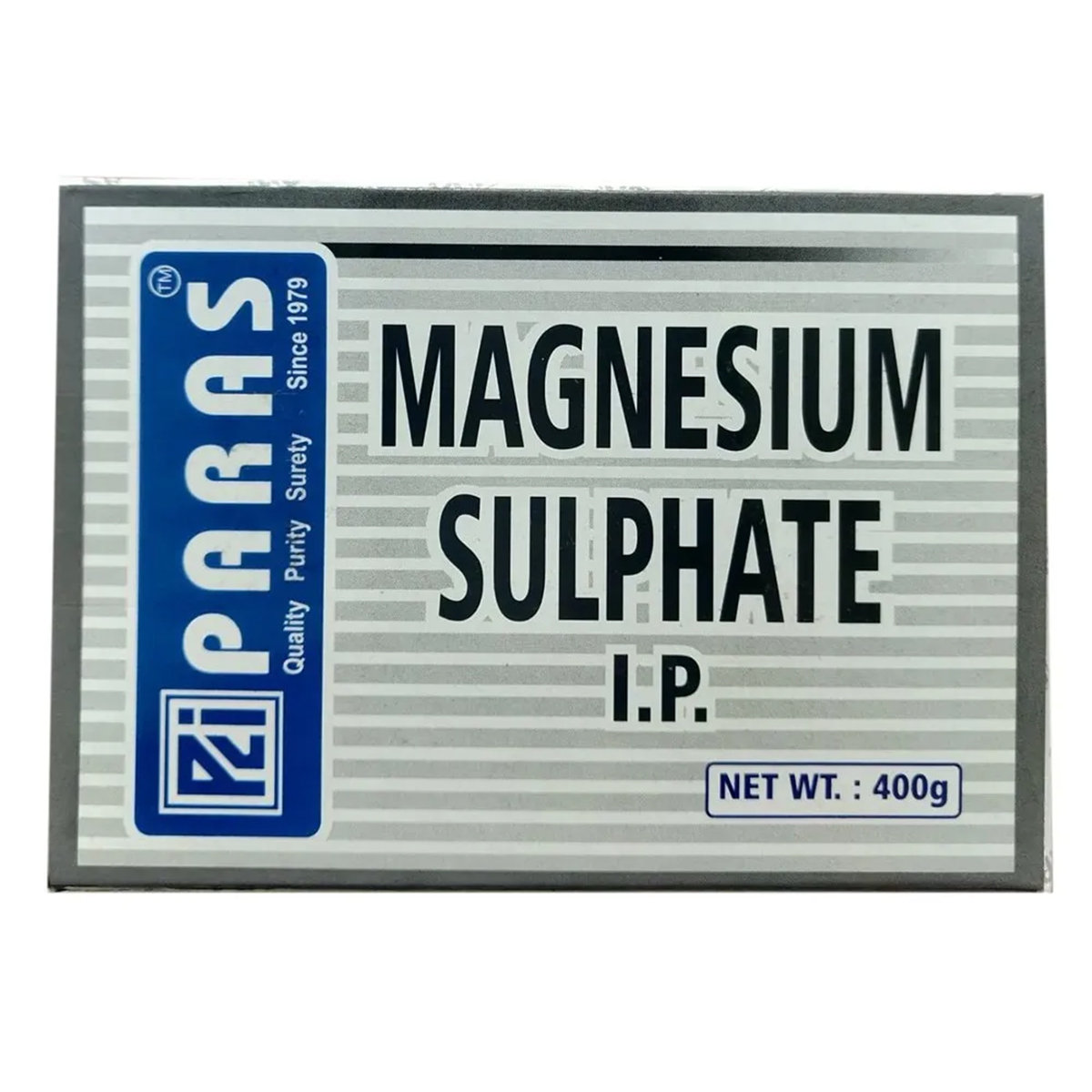Fondared 7.5 Injection
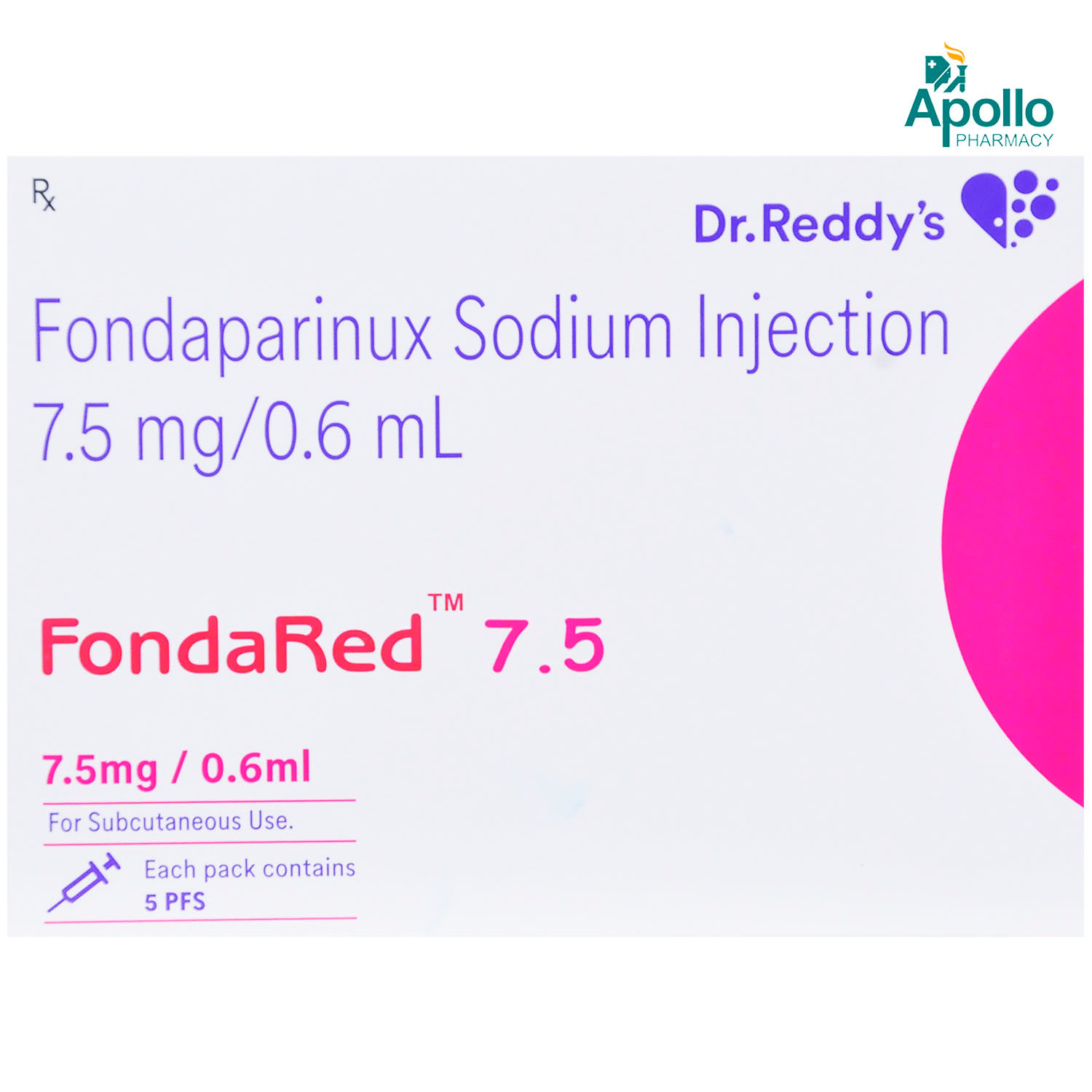
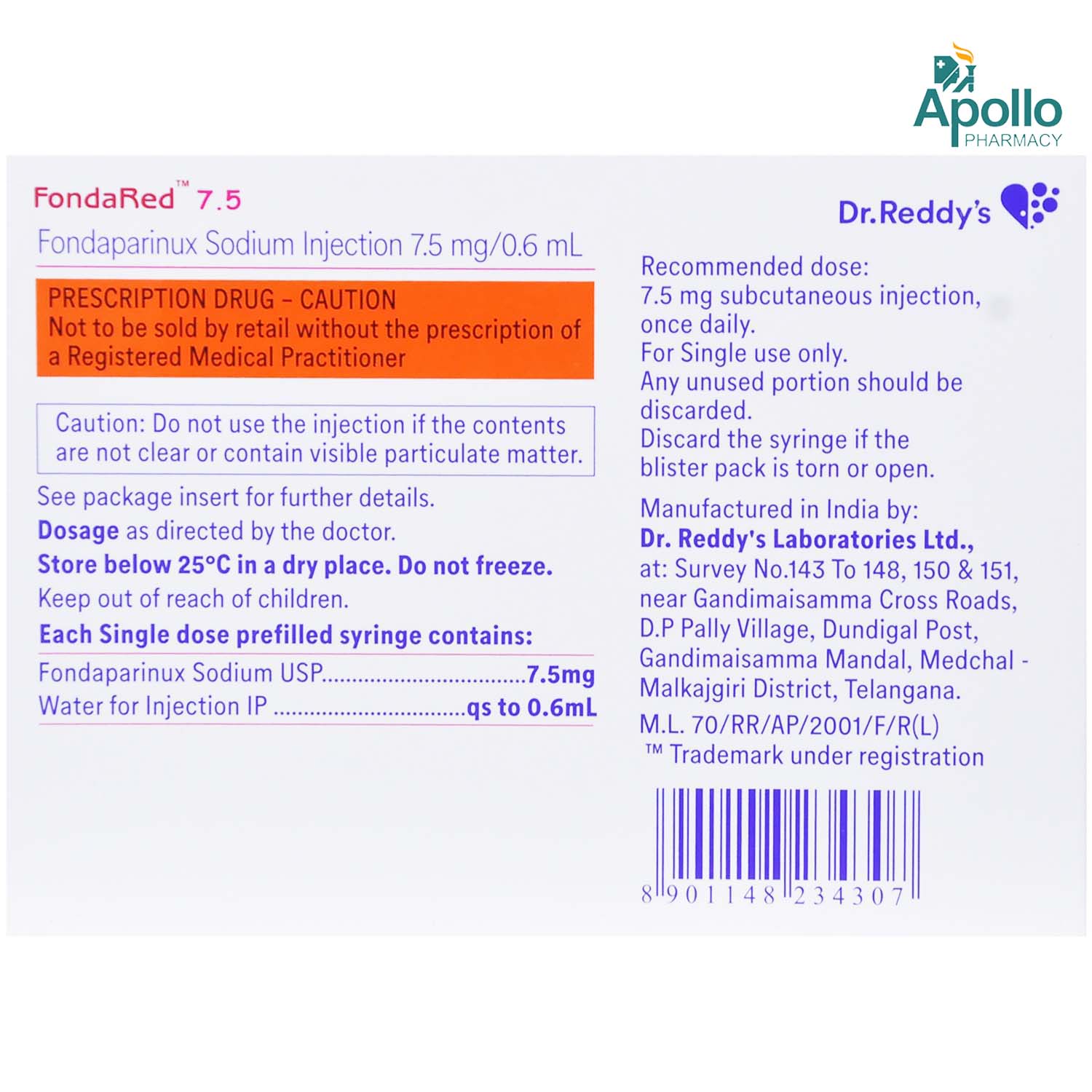
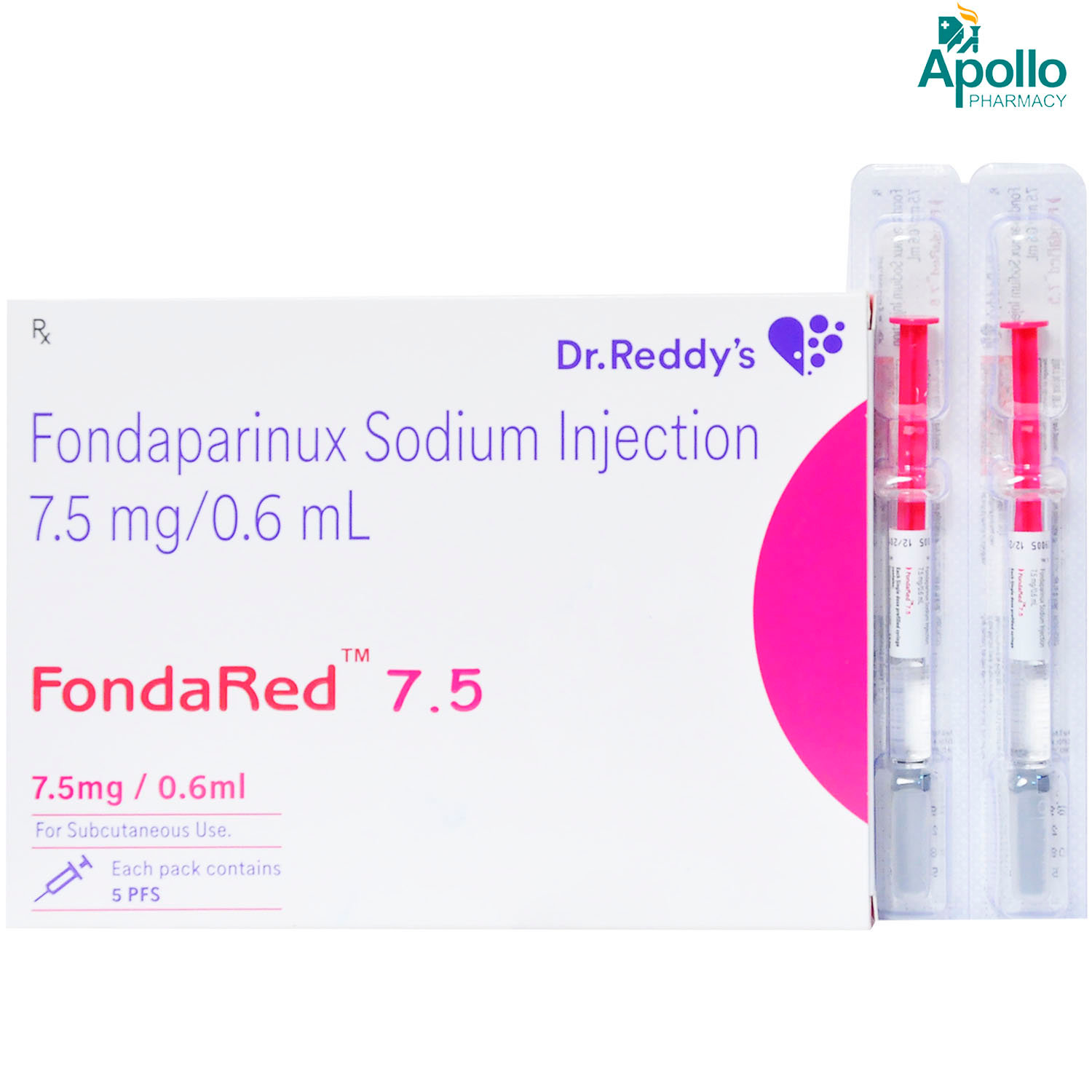
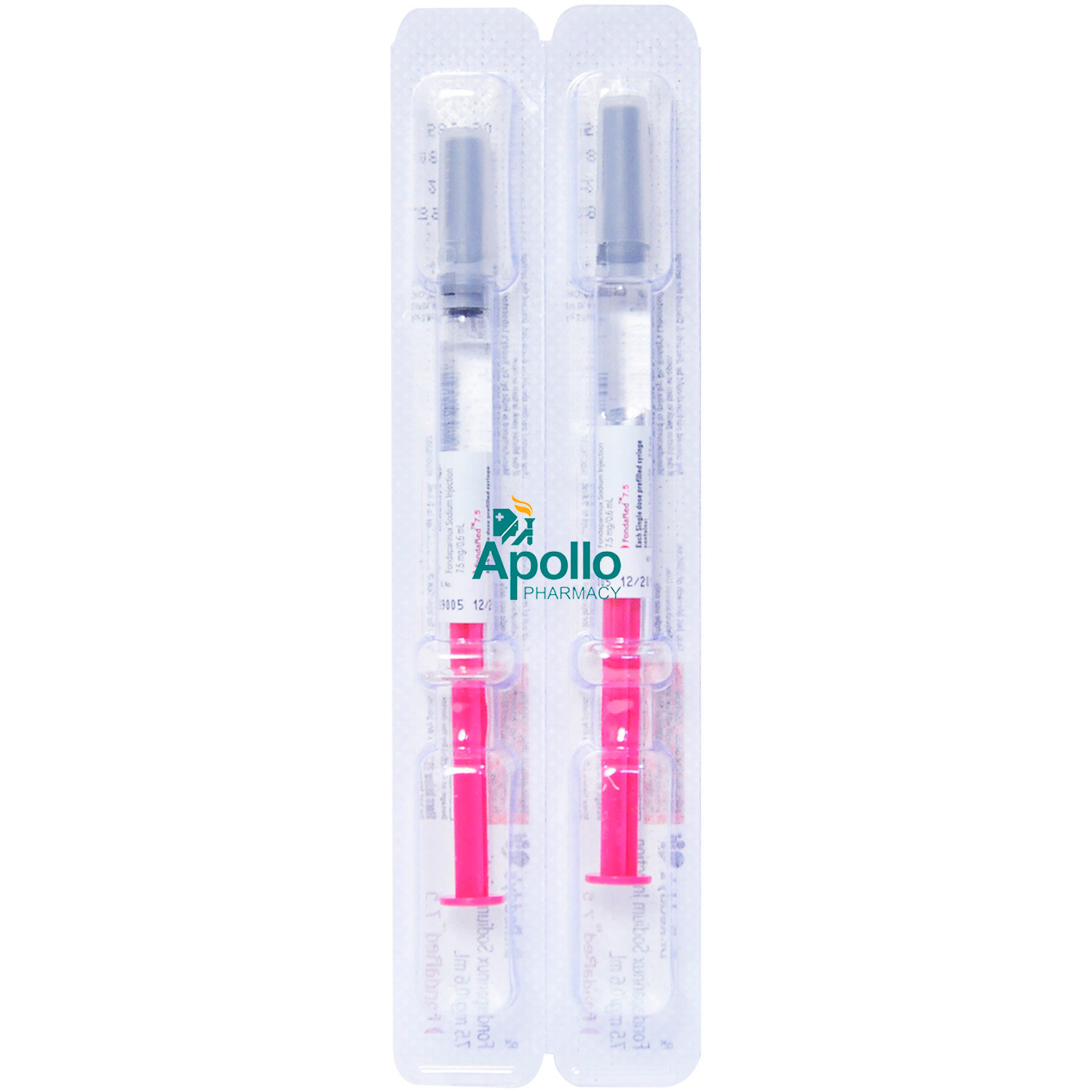
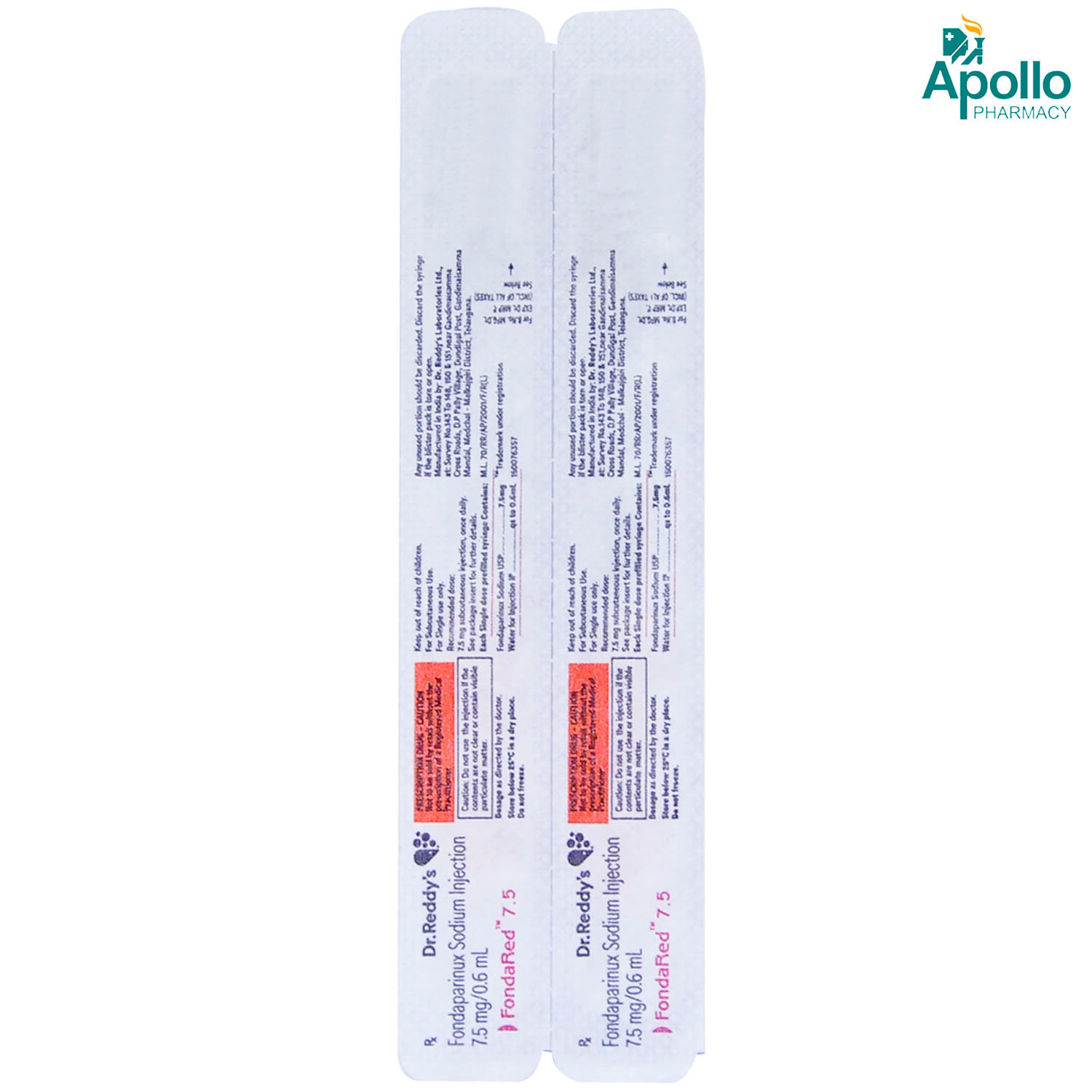
MRP ₹2113.5
(Inclusive of all Taxes)
₹317.0 Cashback (15%)
know your delivery time
Provide Delivery Location
Composition :
Manufacturer/Marketer :
Consume Type :
Expires on or after :
Return Policy :

Secure Payment

Trusted by 8 Crore Indians

Genuine Products
Therapeutic Class
Country of origin
Manufacturer/Marketer address
Author Details
We provide you with authentic, trustworthy and relevant information
Disclaimer
Alcohol
Safe if prescribed
You are recommended to avoid consuming alcohol with Fondared 7.5 Injection as it may increase the risk of bleeding.
Pregnancy
Consult your doctor
Please inform your doctor if you are pregnant or planning pregnancy. Your doctor will prescribe only if it is clearly necessary.
Breast Feeding
Consult your doctor
Breastfeeding is not recommended during treatment with Fondared 7.5 Injection . If you are a nursing mother, inform your doctor before receiving this injection.
Driving
Safe if prescribed
It is unknown if Fondared 7.5 Injection affects your ability to drive or operate machinery. Therefore, drive or operate machinery only if you are alert.
Liver
Consult your doctor
Fondared 7.5 Injection should be used with caution, especially if you have a history of liver diseases. Your doctor may adjust the dose if required based on your condition.
Kidney
Consult your doctor
Fondared 7.5 Injection should be administered with caution if you have a history of kidney diseases. Your doctor may adjust the dose if required based on your condition. This medicine is not recommended for patients with severe kidney disease.
Children
Safe if prescribed
Fondared 7.5 Injection is not recommended for children below 17 years of age as safety and effectiveness have not been established.
Product Substitutes
Keep Refrigerated. Do not freeze.
About Fondared 7.5 Injection
Fondared 7.5 Injection belongs to a class of drugs called anticoagulants (blood thinner) primarily used to prevent/treat deep vein thrombosis (blood clots in leg veins), pulmonary embolism (blood clots in the lung), heart attack, and severe angina. It also reduces the risk of blood clots after orthopedic (such as hip or knee surgery), or abdominal surgery. Fondared 7.5 Injection prevents blood clot formation during and shortly after restricted movement because of an acute illness. Deep vein thrombosis is a medical condition in which blood clots form in deep veins, usually in the legs. Pulmonary embolism is a condition in which a blood clot blocks the arteries in the lungs.
Fondared 7.5 Injection contains ‘Fondaparinux sodium’ that works by inhibiting the action of clotting factors (a natural substance in the blood that causes clotting). Thereby preventing the conversion of fibrinogen to fibrin (a protein that binds platelets together and forms a clot) and helping prevent blood clot formation. It eases blood flow through the veins, making it less likely to develop a severe blood clot.
Fondared 7.5 Injection will be administered by a trained healthcare professional; hence do not self-administer. Some people may experience unusual bleeding, anemia (low number of red blood cells), bruising or swelling. Most of these side effects of Fondared 7.5 Injection do not require medical attention and gradually resolve over time. However, if the side effects persist or worsen, please consult your doctor.
If you are pregnant or breastfeeding, it is advised to consult a doctor before using Fondared 7.5 Injection . Fondared 7.5 Injection is not recommended for children below 17 years of age. Fondared 7.5 Injection should be used with caution in the elderly above 60, as they may be at high risk of bleeding. If you have a stomach ulcer, kidney or liver problems, high blood pressure, or bleeding problems, inform your doctor before receiving Fondared 7.5 Injection . If you are about to undergo surgery, inform your doctor about the treatment with Fondared 7.5 Injection . Keep your doctor informed about your health condition and medications to rule out any interactions.
Uses of Fondared 7.5 Injection
Medicinal Benefits Mweb
Key Benefits
Fondared 7.5 Injection belongs to a class of drugs known as anticoagulants or blood thinners. Fondared 7.5 Injection contains ‘Fondaparinux sodium’ used to prevent deep vein thrombosis (blood clot in the blood vessels of legs) and pulmonary embolism (blood clot in the blood vessels lungs). It also reduces the risk of blood clots during orthopedic (such as hip or knee surgery), abdominal surgery, or restricted movement because of an acute illness. Fondared 7.5 Injection works by stopping the action of clotting factor Xa (a natural substance in the blood that causes clotting). This inhibits fibrin production (a protein that binds platelets together and forms a clot), preventing blood clot formation. Fondared 7.5 Injection is also used to treat certain types of heart attack and chest pain called unstable angina.
Directions for Use
Side Effects of Fondared 7.5 Injection
- Bleeding
- Anaemia (low number of red blood cells)
- Bruising
- Swelling
Drug Warnings
Do not receive Fondared 7.5 Injection if you are allergic to any of the contents; if you are bleeding excessively, have a bacterial heart infection, or have very severe kidney disease. If you are pregnant or breastfeeding, it is advised to consult a doctor before using Fondared 7.5 Injection . Fondared 7.5 Injection is not recommended for children as safety and effectiveness have not been established. Fondared 7.5 Injection should be used with caution in the elderly above 65, as they may be at high risk of bleeding. If you are about to undergo any surgery, inform your doctor that you are receiving Fondared 7.5 Injection . If you notice bleeding gums, blood in urine, coughing up blood or vomit that looks like coffee grounds, pain, swelling, dizziness, weakness, unusual bruising, nose bleeds, abnormal vaginal bleeding or heavy menstrual periods, bloody or tarry stools, please consult a doctor immediately. Avoid alcohol consumption during treatment with Fondared 7.5 Injection as it may increase the risk of stomach bleeding. Inform your doctor before receiving Fondared 7.5 Injection if you have a stomach ulcer, kidney or liver problems, high blood pressure, bleeding problems, are 75 years or older, or weigh less than 50kg. Do not discontinue using Fondared 7.5 Injection without consulting your doctor, as this may increase your chances of having another heart attack or stroke.
Drug-Drug Interactions
Drug-Drug Interactions
Login/Sign Up
Using mifepristone together with Fondared 7.5 Injection 0.6 ml may increase the risk and/or severity of vaginal bleeding in women
How to manage the interaction:
Taking Fondared 7.5 Injection 0.6 ml with Mifepristone together is not recommended as it can result in an interaction, but it can be taken if a doctor has advised it. However, if you experience unusual symptoms contact a doctor immediately. Do not stop using any medications without talking to a doctor.
Taking defibrotide with Fondared 7.5 Injection 0.6 ml can increase the risk of bleeding.
How to manage the interaction:
Co-administration of Fondared 7.5 Injection 0.6 ml with Defibrotide is not recommended, but it can be taken if your doctor has advised it. However, if you experience bleeding, severe back pain, dizziness, black or red stools, severe headache, weakness, and vomiting contact your doctor immediately. Do not stop using any medications without first talking to your doctor.
Taking Ibrutinib with Fondared 7.5 Injection 0.6 ml can increase the risk of bleeding.
How to manage the interaction:
There may be a possibility of interaction between Ibrutinib and Fondared 7.5 Injection 0.6 ml, but it can be taken if prescribed by a doctor. However, if you experience unusual bleeding or bruising, dizziness, lightheadedness, red or black, tarry stools, coughing up or vomiting fresh or dried blood that looks like coffee grounds, severe headache, and weakness, consult the doctor. Do not stop using any medications without a doctor's advice.
Coadministration of Naproxen with Fondared 7.5 Injection 0.6 ml can increase the risk or severity of bleeding.
How to manage the interaction:
Taking Naproxen with Fondared 7.5 Injection 0.6 ml together can possibly result in an interaction, it can be taken if your doctor has advised it. However, if you notice any unusual bleeding or bruising, other signs of bleeding, dizziness, lightheadedness, red or black tarry stools, coughing up or vomiting blood, severe headache, and weakness, you should contact your doctor immediately. Do not stop using any medications without first talking to your doctor.
Taking ketoprofen with Fondared 7.5 Injection 0.6 ml can increase the risk of bleeding complications.
How to manage the interaction:
Taking Fondared 7.5 Injection 0.6 ml with Ketoprofen together can possibly result in an interaction, but it can be taken if your doctor has advised it. However, if you experience bleeding, severe back pain, dizziness, black or red stools, severe headache, weakness, and vomiting contact your doctor immediately. Do not stop using any medications without first talking to your doctor.
Taking argatroban with Fondared 7.5 Injection 0.6 ml can increase the risk of bleeding.
How to manage the interaction:
Although there is an interaction between Fondared 7.5 Injection 0.6 ml and argatroban, they can be taken together if prescribed by a doctor. However, consult a doctor if you experience bleeding, severe back pain, dizziness, black or red stools, severe headache, weakness, and vomiting. Do not discontinue any medications without consulting a doctor.
Taking alteplase with Fondared 7.5 Injection 0.6 ml can increase the risk of bleeding.
How to manage the interaction:
Although there is an interaction between alteplase and Fondared 7.5 Injection 0.6 ml, it can be taken if a doctor has advised it. However, if you experience bleeding or bruising, feeling dizzy or lightheaded, dark or bloody stools, headache, or weakness contact a doctor right away. Do not stop using any medications without talking to a doctor.
Co-administration of Fondared 7.5 Injection 0.6 ml and rivaroxaban can increase the risk of bleeding problems.
How to manage the interaction:
Co-administration of Fondared 7.5 Injection 0.6 ml and Rivaroxaban can lead to interaction, it can be taken if advised by your doctor. However, if you experience bleeding, severe back pain, dizziness, black or red stools, severe headache, weakness, and vomiting contact your doctor immediately. Do not stop using any medications without first talking to your doctor.
Taking tolmetin with Fondared 7.5 Injection 0.6 ml can increase the risk of bleeding.
How to manage the interaction:
Although there is an interaction between Fondared 7.5 Injection 0.6 ml and Tolmetin, they can be taken together if prescribed by your doctor. However, if you experience bleeding, severe back pain, dizziness, black or red stools, severe headache, weakness, and vomiting contact a doctor immediately. Do not discontinue any medications without consulting a doctor.
Taking sulindac with Fondared 7.5 Injection 0.6 ml can increase the risk of bleeding and hemorrhage.
How to manage the interaction:
There may be a possibility of interaction between Fondared 7.5 Injection 0.6 ml and Sulindac, but it can be taken if prescribed by a doctor. However, if you experience bleeding, severe back pain, dizziness, black or red stools, severe headache, weakness, and vomiting contact your doctor immediately. Do not stop using any medications without first talking to your doctor.
Drug-Food Interactions
Drug-Food Interactions
Login/Sign Up
Drug-Diseases Interactions
Drug-Diseases Interactions
Login/Sign Up
Drug-Drug Interactions Checker List
- ASPIRIN
- CELECOXIB
- HEPARIN
Habit Forming
Special Advise
- To analyze your blood clotting time, regular tests such as platelet count, factor V assay, fibrinogen level test, prothrombin time test (PT or PT-INR) and INR (International Normalized Ratio) are advised.
Diet & Lifestyle Advise
- Do not make any changes in your diet without first talking to your doctor.
- Avoid vitamin K-rich foods such as coriander, cabbage, spinach, broccoli, collard greens, kale (leaf cabbage), black liquorice, turnip greens, avocados, and brussels sprouts as they may decrease the effectiveness of Fondared 7.5 Injection .
- Avoid cranberry juice, grapefruit juice, noni juice, pomegranate juice and green tea as they may interact with Fondared 7.5 Injection and lead to unwanted side effects.
- Do regular exercise as it helps to dissolve blood clots, especially in obese people.
- Avoid consumption of alcohol as it may increase the risk of bleeding.
All Substitutes & Brand Comparisons
RX
Out of StockARIXTRA 7.5MG INJECTION
GlaxoSmithKline Pharmaceuticals Ltd
₹1320
(₹1188.0 per unit)
62% CHEAPERRX
Out of StockFonda-X Injection 0.6 ml
Care Organics Ltd
₹1750
(₹2625.0/ 1ml)
17% CHEAPERRX
Out of StockFondaflo 7.5 Injection 0.6 ml
Lupin Ltd
₹1967
(₹2950.5/ 1ml)
6% CHEAPER

Have a query?
Buy best Cardiology products by
Torrent Pharmaceuticals Ltd
Sun Pharmaceutical Industries Ltd
Lupin Ltd
Intas Pharmaceuticals Ltd
Cipla Ltd
Micro Labs Ltd
Macleods Pharmaceuticals Ltd
Abbott India Ltd
Ajanta Pharma Ltd
Ipca Laboratories Ltd
Eris Life Sciences Ltd
Mankind Pharma Pvt Ltd
Lloyd Healthcare Pvt Ltd
Dr Reddy's Laboratories Ltd
Glenmark Pharmaceuticals Ltd
Emcure Pharmaceuticals Ltd
Alembic Pharmaceuticals Ltd
Alkem Laboratories Ltd
East West Pharma India Pvt Ltd
USV Pvt Ltd
Zydus Healthcare Ltd
Aristo Pharmaceuticals Pvt Ltd
Elbrit Life Sciences Pvt Ltd
J B Chemicals & Pharmaceuticals Ltd
Zydus Cadila
Akumentis Healthcare Ltd
Alteus Biogenics Pvt Ltd
Hbc Life Sciences Pvt Ltd
Fusion Health Care Pvt Ltd
Troikaa Pharmaceuticals Ltd
La Renon Healthcare Pvt Ltd
Corona Remedies Pvt Ltd
Jubilant Lifesciences Ltd
Medley Pharmaceuticals Ltd
Knoll Healthcare Pvt Ltd
Msn Laboratories Pvt Ltd
Zuventus Healthcare Ltd
Cadila Pharmaceuticals Ltd
Blue Cross Laboratories Pvt Ltd
Lividus Pharmaceuticals Pvt Ltd
Morepen Laboratories Ltd
Ranmarc Labs
Shrrishti Health Care Products Pvt Ltd
Sanofi India Ltd
Steris Healthcare
Elder Pharmaceuticals Ltd
Primus Remedies Pvt Ltd
Unison Pharmaceuticals Pvt Ltd
Eswar Therapeutics Pvt Ltd
Knoll Pharmaceuticals Ltd
Tas Med India Pvt Ltd
Systopic Laboratories Pvt Ltd
Indiabulls Pharmaceuticals Pvt Ltd
Leeford Healthcare Ltd
Sinsan Pharmaceuticals Pvt Ltd
Biochem Pharmaceutical Industries Ltd
Cadila Healthcare Ltd
Azkka Pharmaceuticals Pvt Ltd
Nirvana India Pvt Ltd
Orsim Pharma
Prevego Healthcare & Research Pvt Ltd
Econ Healthcare
Elinor Pharmaceuticals (P) Ltd
FDC Ltd
Sunij Pharma Pvt Ltd
Nicholas Piramal India Ltd
Astra Zeneca Pharma India Ltd
Pfizer Ltd
Lia Life Sciences Pvt Ltd
Shine Pharmaceuticals Ltd
Elicad Pharmaceuticals Pvt Ltd
Indoco Remedies Ltd
Proqol Health Care Pvt Ltd
Vasu Organics Pvt Ltd
Biocon Ltd
Opsis Care Lifesciences Pvt Ltd
Johnlee Pharmaceuticals Pvt Ltd
Merck Ltd
Wockhardt Ltd
Auspharma Pvt Ltd
Ergos Life Sciences Pvt Ltd
Lakshya Life Sciences Pvt Ltd
Ordain Health Care Global Pvt Ltd
Pficus De Med Pvt Ltd
ALICAN PHARMACEUTICAL PVT LTD
RPG Life Sciences Ltd
Glynis Pharmaceuticals Pvt Ltd
Orris Pharmaceuticals
Samarth Life Sciences Pvt Ltd
Aprica Pharmaceuticals Pvt Ltd
Aretaeus Pharmaceuticals Pvt Ltd
Koye Pharmaceuticals Pvt Ltd
Neocardiab Care
Retra Life Science Pvt Ltd
Alniche Life Sciences Pvt Ltd
Alvio Pharmaceuticals Pvt Ltd
Arkas Pharma Pvt Ltd
Atos Lifesciences Pvt Ltd
Divine Savior Pvt Ltd
Metalis Lifesciences Pvt Ltd
Frequently Bought Together


_0.jpg?tr=q-85)


